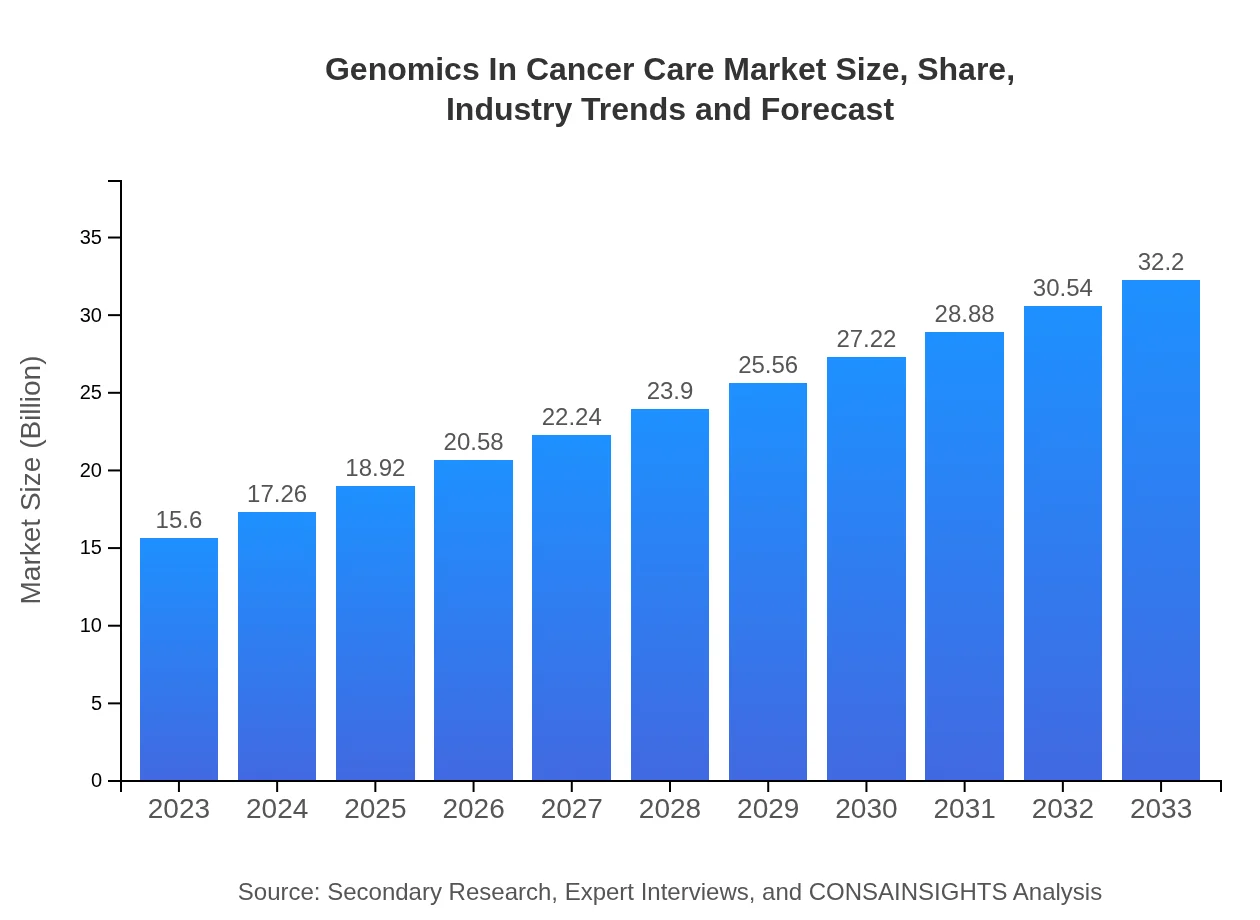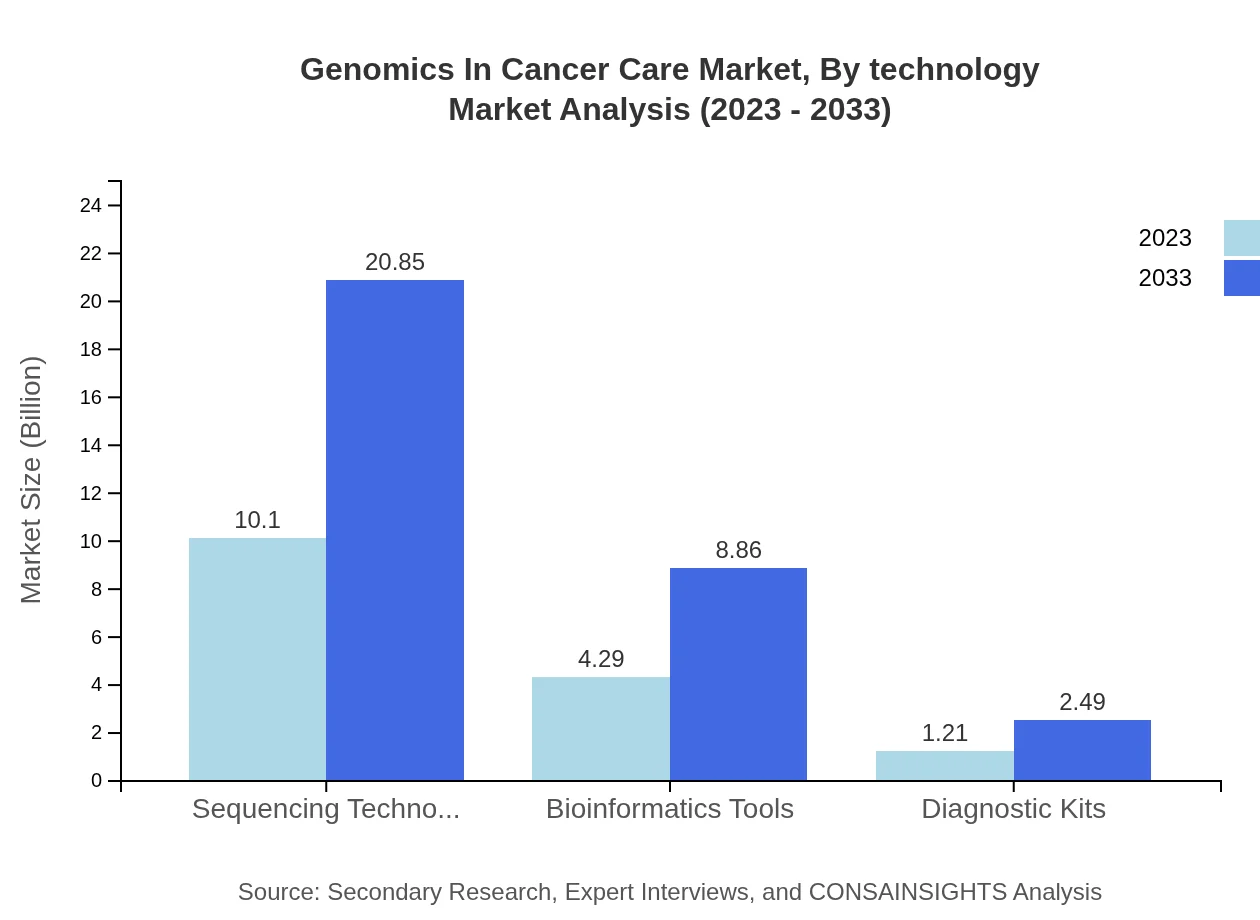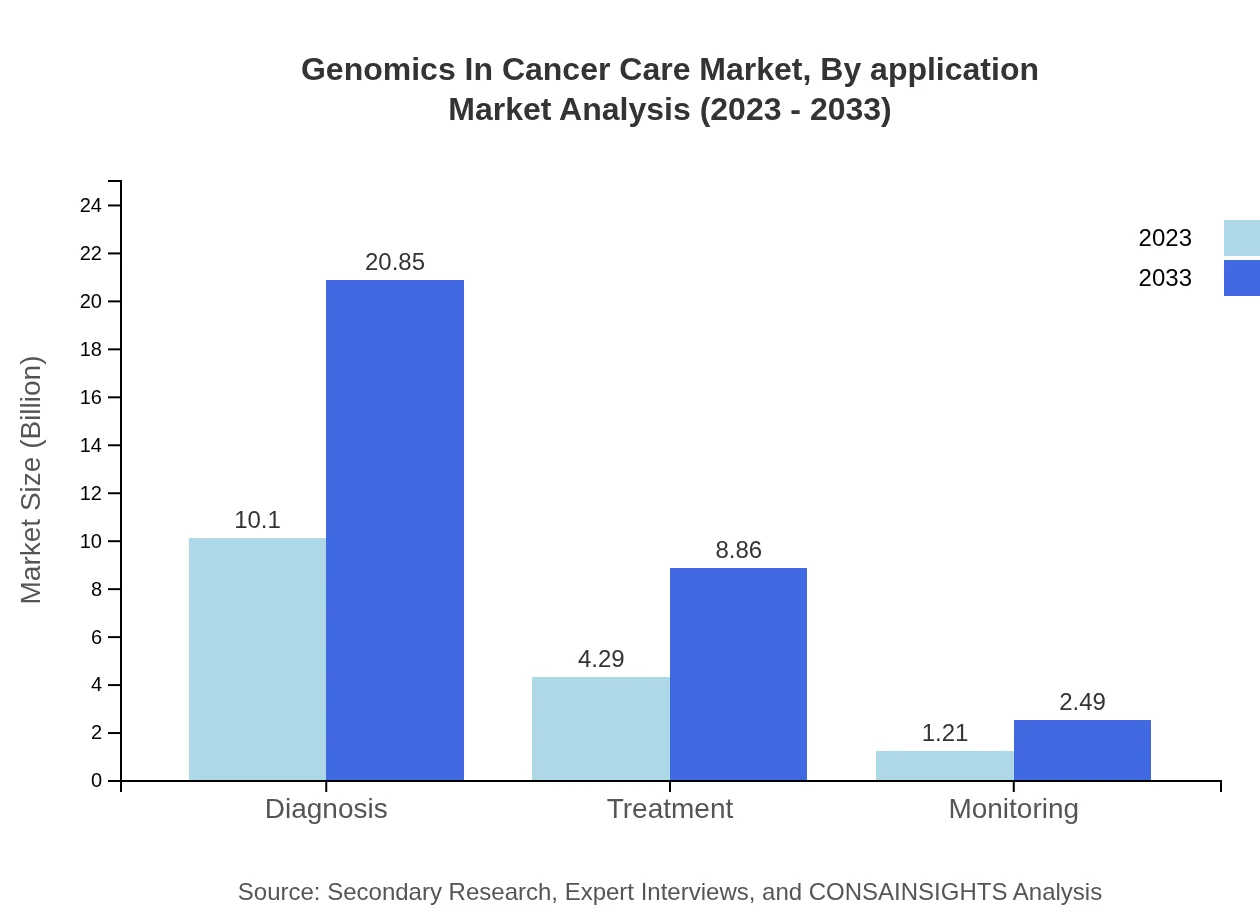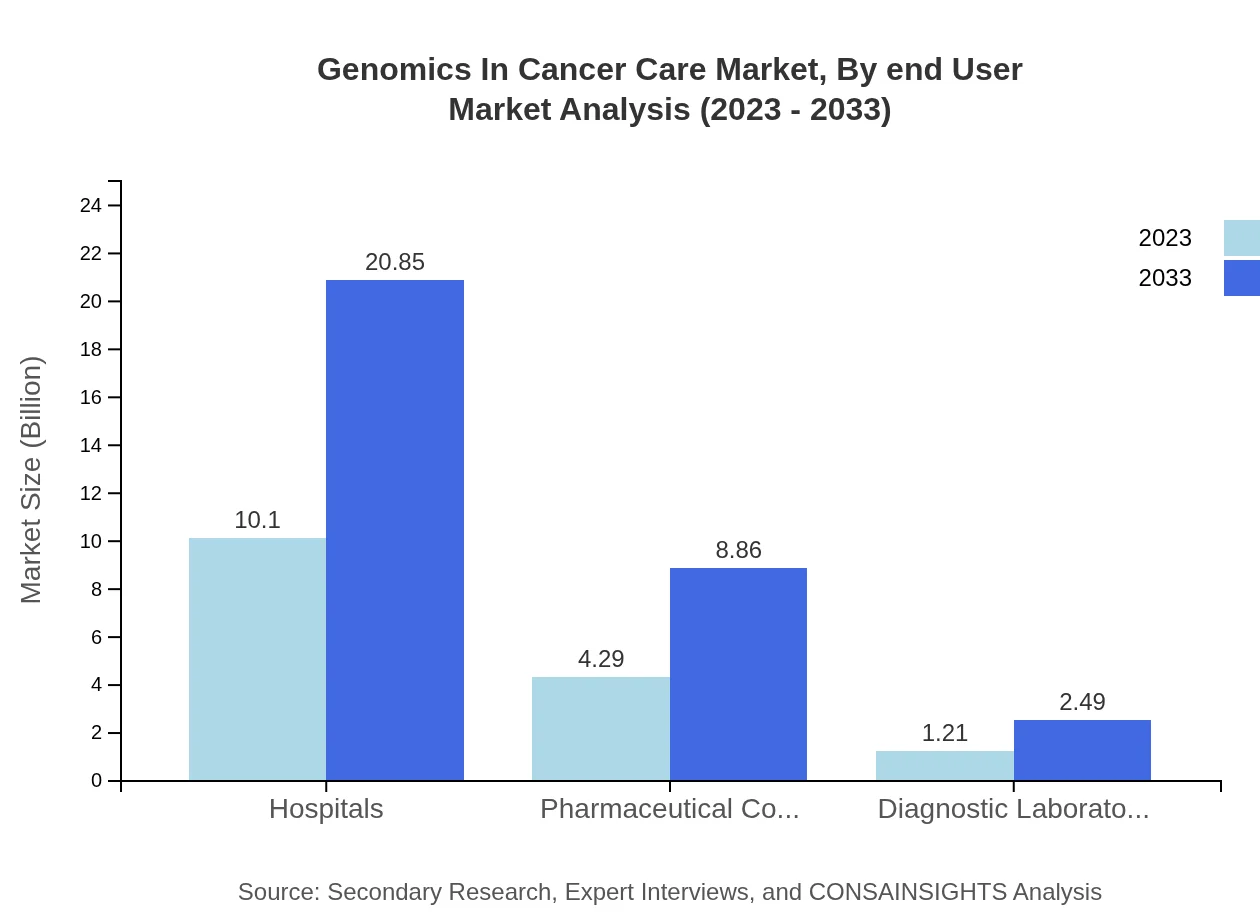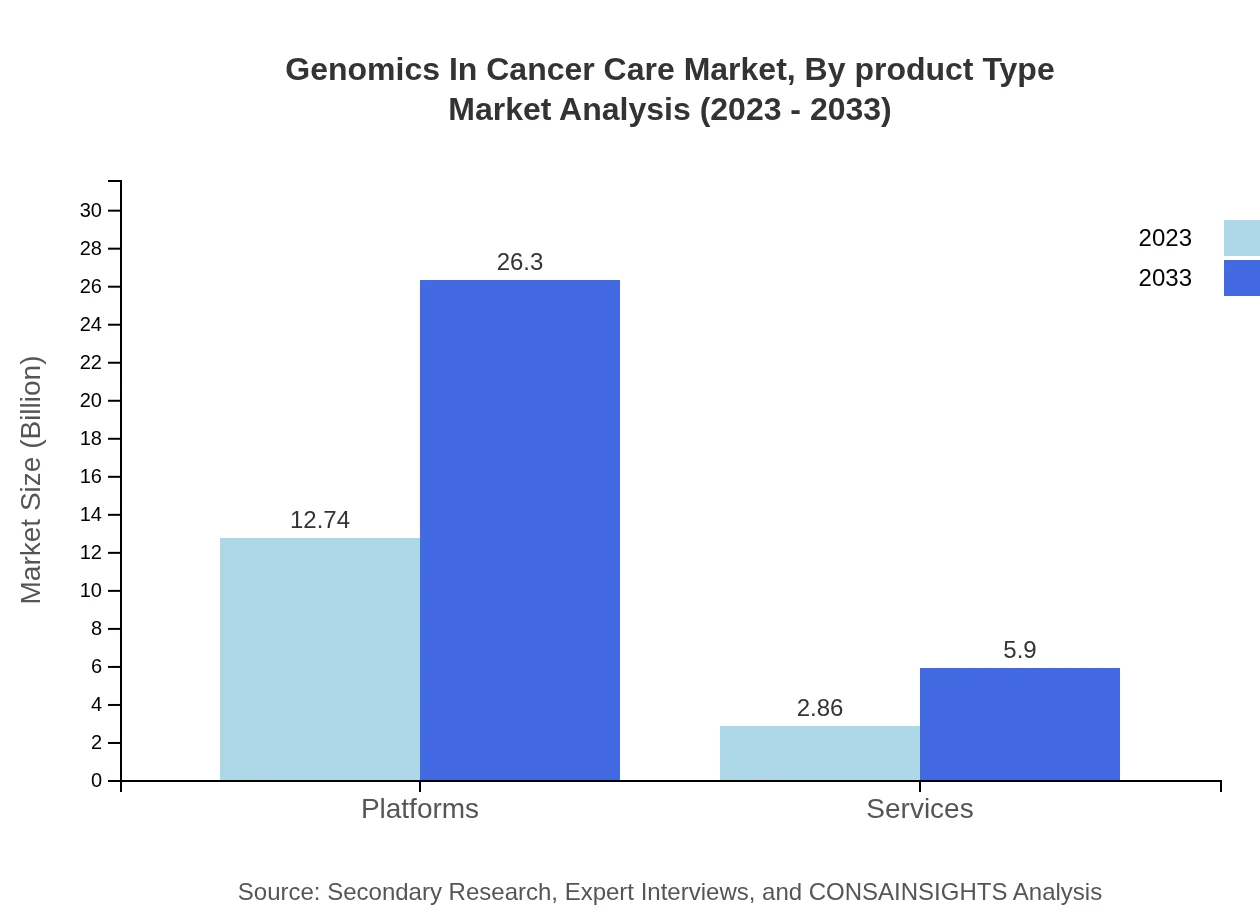Genomics In Cancer Care Market Report
Published Date: 31 January 2026 | Report Code: genomics-in-cancer-care
Genomics In Cancer Care Market Size, Share, Industry Trends and Forecast to 2033
This report provides an in-depth analysis of the Genomics in Cancer Care market, including insights on market size, trends, and forecasts from 2023 to 2033. It covers various market segments, regional performance, and key players in the industry.
| Metric | Value |
|---|---|
| Study Period | 2023 - 2033 |
| 2023 Market Size | $15.60 Billion |
| CAGR (2023-2033) | 7.3% |
| 2033 Market Size | $32.20 Billion |
| Top Companies | Illumina, Inc., Thermo Fisher Scientific, Inc., Roche Diagnostics, Qiagen N.V. |
| Last Modified Date | 31 January 2026 |
Genomics In Cancer Care Market Overview
Customize Genomics In Cancer Care Market Report market research report
- ✔ Get in-depth analysis of Genomics In Cancer Care market size, growth, and forecasts.
- ✔ Understand Genomics In Cancer Care's regional dynamics and industry-specific trends.
- ✔ Identify potential applications, end-user demand, and growth segments in Genomics In Cancer Care
What is the Market Size & CAGR of Genomics In Cancer Care market in 2023?
Genomics In Cancer Care Industry Analysis
Genomics In Cancer Care Market Segmentation and Scope
Tell us your focus area and get a customized research report.
Genomics In Cancer Care Market Analysis Report by Region
Europe Genomics In Cancer Care Market Report:
The European genomics market is anticipated to grow from $4.28 billion in 2023 to $8.84 billion by 2033. Factors such as increasing collaborations among academic and clinical research institutions, heightened focus on personalized medicine, and supportive government policies enhance market growth potential. The EU's emphasis on precision medicine is likely to aid in expanding genomic services.Asia Pacific Genomics In Cancer Care Market Report:
The Asia-Pacific region is experiencing significant growth in the genomics market, anticipated to reach $6.76 billion by 2033, expanding from $3.27 billion in 2023. Increased investment in healthcare infrastructure, along with rising cancer incidences, supports this growth. The demand for personalized medicine is also contributing significantly, as local patients are more willing to opt for advanced diagnostic options.North America Genomics In Cancer Care Market Report:
The North American market for genomics in cancer care holds the largest share, projected to rise from $5.61 billion in 2023 to $11.57 billion by 2033. The presence of key players, robust healthcare systems, and high adoption rates of genomic testing technologies contribute to this growth. Continuous investment in R&D for cancer therapies further propels the market forward.South America Genomics In Cancer Care Market Report:
In South America, the genomics market is expected to grow from $0.55 billion in 2023 to $1.14 billion by 2033. Increased awareness about genomic testing and growing healthcare access will drive market growth. However, the region faces challenges such as resource constraints and regulatory barriers that could hinder faster advancements.Middle East & Africa Genomics In Cancer Care Market Report:
The Middle East and Africa region is projected to increase from $1.89 billion in 2023 to $3.90 billion by 2033, driven by rising prevalence of cancer and gradual improvements in healthcare services. While infrastructure challenges persist, collaborations between governments and private sectors are expected to stimulate growth in genomic services.Tell us your focus area and get a customized research report.
Genomics In Cancer Care Market Analysis By Technology
In the Genomics in Cancer Care market, sequencing technologies dominate, accounting for a significant market share and expected to reach $20.85 billion by 2033 from $10.10 billion in 2023. Bioinformatics tools are anticipated to grow from $4.29 billion in 2023 to $8.86 billion by 2033, reflecting the increasing importance of data management and analysis in genomics.
Genomics In Cancer Care Market Analysis By Application
The Genomics in Cancer Care market segments application into diagnosis, treatment, and monitoring, with diagnosis leading the way. The market for diagnostics is forecasted to grow from $10.10 billion in 2023 to $20.85 billion by 2033. Therapeutic applications are predicted to grow from $4.29 billion to $8.86 billion in the same period, driven by advances in targeted therapies.
Genomics In Cancer Care Market Analysis By End User
End-users include hospitals, pharmaceutical companies, and diagnostic laboratories. Hospitals are the largest segment, representing a market size of $10.10 billion in 2023 and expected to reach $20.85 billion by 2033, fortified by the increasing integration of genomics in clinical settings. Pharmaceutical companies and diagnostic labs also represent significant portions of the market.
Genomics In Cancer Care Market Analysis By Product Type
Product types consist of platforms, services, and diagnostic kits. Platforms have a substantial market share, expected to grow from $12.74 billion in 2023 to $26.30 billion by 2033. Services are also growing steadily, increasing from $2.86 billion to $5.90 billion, reflecting the rising demand for genomic testing and analysis services in clinical practice.
Genomics In Cancer Care Market Trends and Future Forecast
Tell us your focus area and get a customized research report.
Global Market Leaders and Top Companies in Genomics In Cancer Care Industry
Illumina, Inc.:
Illumina is a leading developer and manufacturer of life science tools and integrated systems for large-scale analysis of genetic variation and function, significantly contributing to cancer genomics.Thermo Fisher Scientific, Inc.:
Thermo Fisher Scientific offers a range of products and services that support genomics and molecular diagnostics, including advanced sequencing technologies and bioinformatics solutions.Roche Diagnostics:
Roche is a key player in molecular diagnostics and offers a comprehensive portfolio of genomic testing platforms that are critical for personalized cancer treatment.Qiagen N.V.:
Qiagen provides innovative sample and assay technologies for molecular diagnostics, offering solutions that facilitate cancer genomics and research.We're grateful to work with incredible clients.









FAQs
What is the market size of genomics In Cancer Care?
The genomics-in-cancer-care market is projected to reach approximately $15.6 billion by 2033, growing at a CAGR of 7.3%. This growth reflects increasing adoption of genomic profiling in cancer treatment and advances in technology.
What are the key market players or companies in the genomics In Cancer Care industry?
Key players in the genomics-in-cancer-care industry include major pharmaceutical companies, diagnostic labs, and tech firms specializing in bioinformatics and sequencing technologies, contributing to innovative cancer treatment solutions and expanding market dynamics.
What are the primary factors driving the growth in the genomics In Cancer Care industry?
Factors driving growth in the genomics-in-cancer-care sector encompass advancements in genomic technologies, increased research funding, rising prevalence of cancer, and growing awareness of personalized medicine, ultimately enhancing treatment outcomes.
Which region is the fastest Growing in the genomics In Cancer Care?
The fastest-growing region in the genomics-in-cancer-care market is North America, with a projected market size growing from $5.61 billion in 2023 to $11.57 billion by 2033, driven by advancements in healthcare infrastructure and research initiatives.
Does ConsaInsights provide customized market report data for the genomics In Cancer Care industry?
Yes, ConsaInsights offers customized market report data tailored to specific needs within the genomics-in-cancer-care industry, providing insights into market trends, competitive landscape, and sector performance.
What deliverables can I expect from this genomics In Cancer Care market research project?
Deliverables from the genomics-in-cancer-care market research project typically include detailed market analysis, growth forecasts, competitive assessments, and comprehensive reports focusing on key trends and insights across different segments.
What are the market trends of genomics In Cancer Care?
Current market trends in genomics-in-cancer-care include a shift towards personalized medicine, integration of digital health technologies, and increased collaborations between biotechnology firms and research institutions, aiming to enhance treatment precision.

